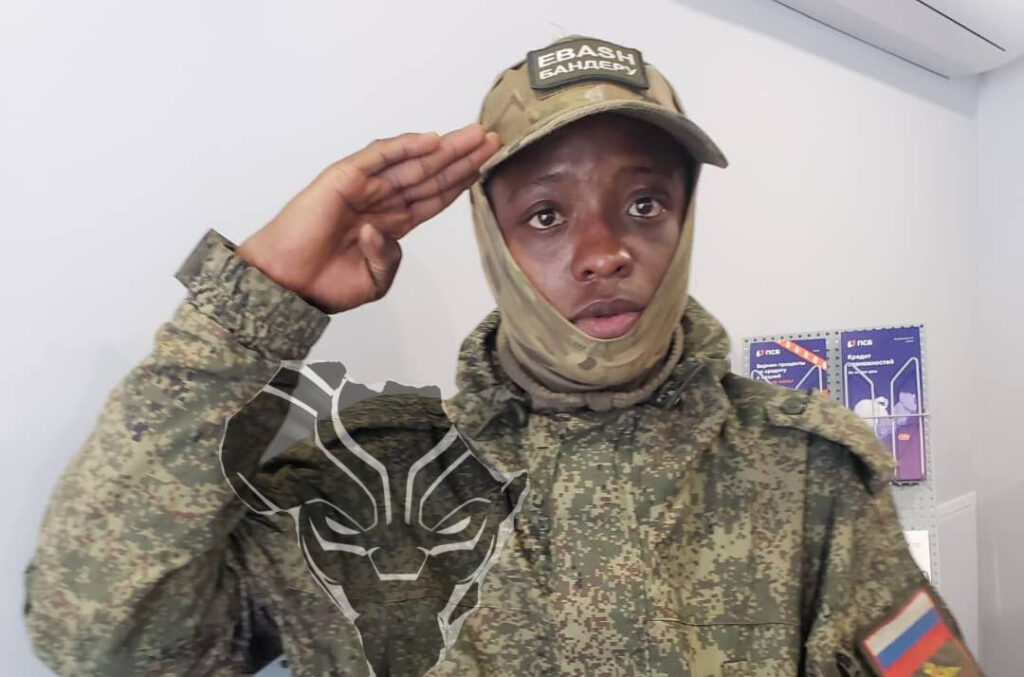Regardless of whether Awamo Mitterrand was tricked or coerced into enlisting in the Russian Army, he was sent to the front lines in Ukraine and killed in battle on February 26, his body abandoned by the Russians in a forest.
CamerounWeb, a news site, published the report in March along with an editorial comment: “This is the umpteenth Cameroonian to die in the prime of life in the Russian army. This situation should be a wake-up call for young Cameroonians who decide to accept this poisoned opportunity.”
A steady stream of posts have appeared on websites and social media platforms in Cameroon in recent months from people seeking information about friends or relatives who joined the Russian military and then stopped communicating. The messages often are accompanied by photographs of African men in Russian fatigues.
“My friend went to Russia … and for nearly four months we haven’t heard from him,” said one. “We’d like to know if he’s still alive or dead.”
Some posts are updated to explain that the missing person has been killed in Russia’s war in Ukraine. A Cameroonian who goes by the name N’zui Manto has gathered many of these stories. CamerounWeb refers to Manto as a whistleblower and reported on May 27 that Manto said at least 65 Cameroonians had been killed in the war.
Using middlemen and recruiters, Russia is targeting the armed forces of West African nations to fight in its war against Ukraine, now in its third year. According to the Institute for Security Studies (ISS), the Cameroon Armed Forces (FAC) is being targeted due to its transformation into a skilled workforce. Soldiers possess valuable technical knowledge and have solid experience in combating terrorism, piracy and other security threats.
Raoul Sumo Tayo, a researcher with the South Africa-based ISS, said the FAC can’t afford to lose Soldiers to Russia while continuing to fight its own difficult war against extremist militant organizations in its Northwest and Southwest regions.
“While no official statistics exist on desertion rates, the situation is concerning for a country grappling with threats from Boko Haram in the north, Central African Republic rebels in the east, maritime piracy along the coast, and the Anglophone crisis in the west,” he wrote in an April 2 article for ISS.
ISS interviewed Cameroonians who described an active local network of recruiters that Russia has used to attracted and recruit people. Exploiting a severe pay gap, FAC deserters told ISS they were promised monthly salaries of $1,976 to $2,479, while specialists would make at least $3,294 a month.
British military intelligence sources similarly have reported a $2,000 signing bonus, a $2,200 monthly salary and the promise of a Russian passport.
With military salaries in Cameroon considerably lower by comparison, the country is taking steps to protect its investment of highly trained, skilled Soldiers.
In a March 7 statement, Cameroonian Defense Minister Joseph Beti Assomo announced that all military personnel were prohibited from leaving the country.
“Following reliable concordant information concerning the clandestine departure of certain elements of the defense and security forces, do take all necessary urgent and appropriate dispositions to ensure the tightened control of the men within your ranks,” the minister said.
Tayo said Cameroonian authorities also worry about the risk associated with deserters who could return as combat-tested veterans.
“Having gained combat experience in Ukraine, they could use their operational skills and high-intensity combat abilities against Cameroon’s security interests,” he wrote.
Cameroonian Soldiers lucky enough to survive the horrific fighting in Ukraine could return with post-traumatic stress disorder mental issues, which could strain the social fabric of local communities.
Security experts warn that curtailing movements of Soldiers will not solve the desertion problem and recommend that Cameroonian authorities go after the recruiting networks themselves that are subverting the nation’s security forces.

